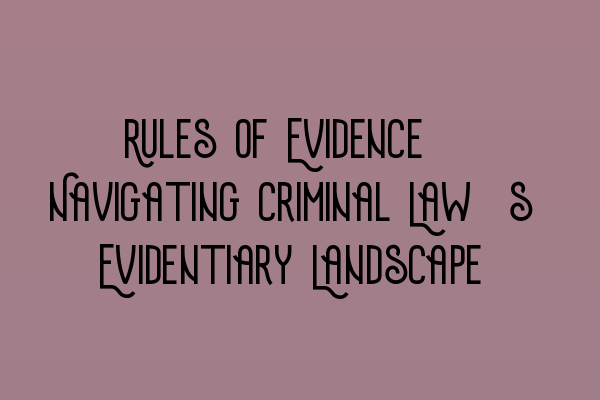Rules of Evidence: Navigating Criminal Law’s Evidentiary Landscape
As criminal defense solicitors, understanding the rules of evidence is crucial in building a strong defense strategy for our clients. The evidentiary landscape in criminal law can be complex and challenging to navigate, but with the right knowledge and expertise, we can ensure the best possible outcome for our clients.
Relevant Keyword: Criminal Law
First and foremost, it’s important to have a solid understanding of the foundations of criminal law. This includes being familiar with key concepts such as actus reus, mens rea, and the elements of various criminal offenses. Understanding these principles is essential to identifying the relevant evidence that will support our clients’ defense.
Related Article: SQE 1 Preparation Courses
Admissible Evidence: The Cornerstone of a Strong Defense
Admissible evidence plays a pivotal role in criminal proceedings. It refers to evidence that is legally allowed to be presented in court and considered by the judge or jury. As solicitors, it’s our responsibility to ensure that the evidence we present meets the requirements of admissibility.
Related Article: SQE 2 Preparation Courses
Admissibility is determined by various factors, including relevance, credibility, and reliability. We must carefully scrutinize the evidence we plan to present and ensure it meets these criteria. This may involve conducting thorough investigations, interviewing witnesses, and employing forensic experts to analyze and authenticate the evidence.
The Importance of Chain of Custody
One crucial aspect of admissibility is establishing and maintaining a proper chain of custody for physical evidence. This refers to the documented chronological record of the possession, handling, and location of evidence from the moment it is collected until its presentation in court.
Related Article: SRA SQE Exam Dates
A strong chain of custody is essential to ensure that the evidence is not tampered with or compromised in any way. Any gaps or inconsistencies in the chain of custody can raise doubts about the integrity of the evidence and potentially lead to its exclusion from trial.
Expert Witnesses: Strengthening the Defense
In complex criminal cases, expert witnesses can provide invaluable insights and opinions based on their specialized knowledge and expertise. Expert witnesses can provide scientific, technical, or professional opinions on matters such as DNA analysis, ballistics, forensic psychology, or accident reconstruction.
Related Article: SQE 1 Practice Mocks FLK1 FLK2
Integrating expert witnesses into our defense strategy can enhance the credibility and persuasiveness of our arguments. Their testimony can help the judge or jury make more informed decisions and better understand complex scientific or technical evidence.
The Role of Precedent
Precedent plays a vital role in shaping the evidentiary landscape in criminal law. Case law establishes legal principles and rules of evidence based on previous court decisions. As solicitors, it’s crucial to stay up to date with the latest precedent that may impact our clients’ cases.
Related Article: SQE 1 Practice Exam Questions
By analyzing and applying relevant precedents, we can argue for the admission or exclusion of specific evidence based on established legal principles. This demonstrates our expertise and understanding of the evidentiary landscape, ultimately working towards the best outcome for our clients.
Conclusion:
Navigating the evidentiary landscape in criminal law requires a comprehensive understanding of the rules of evidence, admissibility requirements, and the use of expert witnesses. By staying up to date with the latest precedent and diligently assessing the chain of custody for physical evidence, we can build a strong defense strategy for our clients.
Related Articles:
- SQE 1 Practice Exam Questions
- SQE 1 Practice Mocks FLK1 FLK2
- SQE 2 Preparation Courses
- SQE 1 Preparation Courses
- SRA SQE Exam Dates
